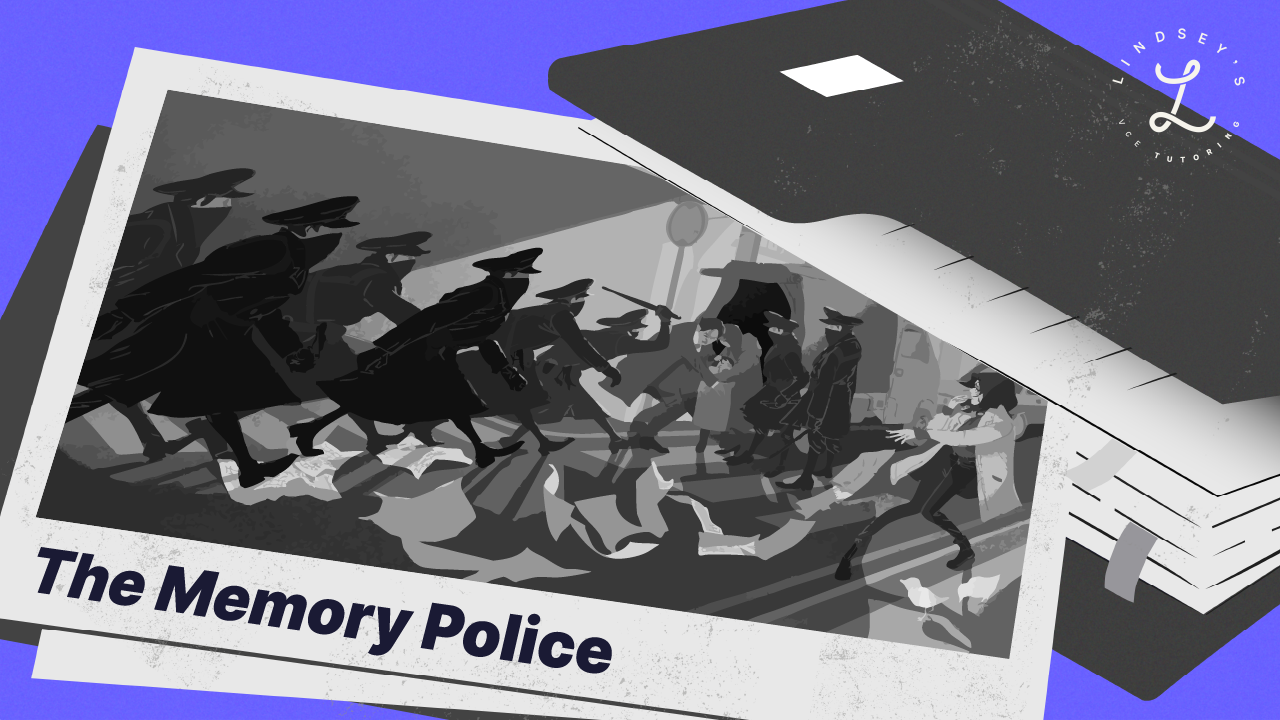
An Ultimate Guide to The Memory Police
The Memory Police offers a poetic yet poignant commentary on the effects of memory loss, both on individuals and society as a whole. As the citizens of the unnamed island gradually fall victim to the oppression enforced by the titular militia, acclaimed Japanese author Yoko Ogawa’s Orwellian novel interrogates the dangers of ideological conditioning and the existential threats it poses to humanity. With the inexplicable “disappearances” of objects occurring seamlessly on the island, the inhabitants quickly and unquestioningly adapt to the changes. However, the disappearances worsen, evolving from the loss of birds to the eventual loss of human limbs. The Memory Police’s authoritarian control ensures that the disappearances occur systematically, ruthlessly concealing any deliberate rebellion to the regime.
The novel unfolds on an unnamed island where objects mysteriously "disappear" not just physically, but from the collective memory of the inhabitants. It narrative follows an unnamed protagonist, a novelist, as she witnesses the gradual erosion of her world under the surveillance of the titular Memory Police. When her editor, R, is revealed to be one of the few who can retain memories of disappeared objects, she conspires with an old family friend to hide him from authorities. As the disappearances escalate from objects like birds and roses to more fundamental aspects of human existence like limbs and voices, the narrator grapples with the increasing emptiness of her world while attempting to preserve both R's life and her own creative spirit through her writing.
Authorial Intent
Through her novel, The Memory Police, Yoko Ogawa explores the fragility of memory and its profound connection to human identity, exemplifying how erasure leads to both personal and collective loss. Her representation of authoritarian control by the titular police is intended to critique oppressive regimes that exert control over both the tangible and psychological world. Within her mise-en-abyme, Ogawa characterises the typing teacher as the police force and the typist as the citizens in order to reveal the true extent of the leadership’s seemingly benign actions on the island. Yet, amidst the bleak landscape, Ogawa accentuates the power of non-compliance, encapsulating that storytelling and human connections can preserve humanity. Ultimately, the novel acts as a meditation on the normalisation and inevitability of loss, articulating that whilst forgetting is unavoidable, the human soul can endure through connection, creativity and covert forms of defiance.
Genre and Social Context
The Memory Police emerges from Japan's complicated relationship with historical memory and authoritarian control. Written in 1994 but finding renewed relevance in contemporary discussions of state surveillance and collective memory, the novel draws on multiple historical touchstones. Its portrayal of systematic erasure evokes Japan's own historical revisionism regarding events like the Nanking Massacre and comfort women, while the methodical disappearances mirror the gradual erosion of rights under totalitarian regimes.
The work's magic realist elements place it within a literary tradition that includes both Western influences and Japanese magical realist writers like Haruki Murakami, taking an Orwellian and Kafkaesque turn as readers are revealed to the somnolent atmosphere of the unnamed island. The story reflects the destructive nature of totalitarian control, drawing parallels between the constant surveillance, propaganda and the suppression of individuality prevalent in 1984. Further, with the eventual destruction of books, readers are rendered reminiscent of the ways in which the Party alters history and Newspeak, eradicating any evidence of the island’s collective identity. Yet, the substitution of violence that archetypally characterises dystopian realms imbues in Ogawa’s narrative the illusion of normality. Ogawa subtly echoes 1984 and its concept of the Memory Hole, illustrating how inconvenient truths can be obscured by those who perpetrate injustice but also by the complicit silence of ordinary citizens.
The novel also explicitly alludes to the oppressive regimes of Nazi Germany, accentuating the brutality of the oppression and by extension the routinisation of disappearances which renders them banal and quotidian in nature. This, coupled with the ethereal ways in which the disappearances are implemented, serves to juxtapose the beauty and horrors that the characters dually experience, delineating the shift from a dystopian setting to a more anti-utopian one. There are also significant allusions to times of extreme censorship like when books are “disappeared” reminding readers of how symbolic attacks on intellectual freedom eventually transformed to violent attacks on physical freedom. Moreover, the old man’s and narrator’s joint mission to create a hiding place for R is intended to reflect Anne Frank’s experience of Nazi-occupied Amsterdam to accentuate the extent to which people will resist during times of totalitarian control.
Themes
Authoritarianism, memory and identity
The novel explores the intrinsic connection between memory and identity, suggesting that selfhood is fundamentally constructed through remembrance. As memories disappear, the islanders lose not just objects but aspects of their humanity. This erosion of memory leads to what Ogawa presents as a form of living death, where people exist but are increasingly hollow. The eponymous police systematically execute “disappearances,” monitoring the island in order to conceal any form of rebellion. They are presented as an omnipresent force, their encroaching control through the initially seemingly benign disappearances of “birds” evolving into domination over the entire corporeal frame by the end of the novel. In doing so, Ogawa suggests that the force have succeeded in acquiring control of both the mental and realms, rendering the citizens devoid of any autonomy. In stark contrast to the pernicious actions of the police are the desensitised reactions of the citizens who quickly adapt to the changes when they are carried out (e.g. changing professions, disposing of flowers), sometimes even describing them as “beautiful.” Here, Ogawa challenges contemporary Japanese culture’s idealisation of exterior appearance and perfection above all which eventually leads to a misguided reverence of their oppressors.
The enforced amnesia also leads to an eventual loss of human identity, both individual and collective as the citizens relinquish their profound connections to memorabilia. Through the physical deterioration of the island - characterised by “gaps”, “holes” and “absences” - which allegorically represents the erosion of the islanders’ humanity as their “hearts got thinner,” Ogawa insinuates that memory is fundamentally crucial to human existence. As they succumb entirely to the wrath of the eponymous police, the citizens’ individuality is quashed leading to an overtly ritualic existence driven by “repeated gestures.”Whilst the repression of the titular police seems deceptively benign in nature, Ogawa’s representation of the islanders’ homogenisation and subsequent demise characterises the oppression as insidious as they are eventually stripped of their humanity.
Loss and acceptance
The novel examines the paradoxical human capacity to normalise profound loss. Disappearances in the novel are labelled an inevitable phenomenon, adhering to the magic realist setting of the story. To further underpin this inevitability is the frequent incorporation of natural imagery as the snow is “dump[ed] into the sea” to evoke the easy disposal of memories. The loss of memory is analogised with the process of melting and dissolution as just as snow “melts and mixes with saltwater,” memory becomes gradually eroded and replaced by “holes.” Nonetheless, the citizens display little resistance towards the regime, quickly adapting to lives devoid of meaningful objects. With the disappearances taking place in the “sea” or “river,” Ogawa connotes their fluidity, rendering it a seamless integration within the citizens’ livelihoods. Functioning alongside this is the nautical imagery of the “sea…swallowing [snow] down its enormous throat.” Here, the supernatural forces align with the magic realist depiction of authoritarianism, subtly euphemising its influence and reinforcing the blameless facade of the titular police. As such, Ogawa contextualises the citizens’ easy acceptance of their loss as a natural part of life. Hence, Ogawa typifies how societies can become desensitised to their own suffering, treating even profound absences as routine.
Ogawa demonstrates how forced amnesia can lead to the mindless acquiescence of a populace due to the inevitable desensitisation towards repression. But what is most significant is Ogawa’s purposeful but subtle omission of the consequences an individual may be subjected to for defying social norms. As such, she suggests that severe acquiescence to an authoritarian regime is largely due to the citizens’ fear of the unknown. Even those who are cognisant of their loss quickly adapt to the changes, mirroring the “petals that…came flooding in to fill the “cleared patch of water” only to disappear later. With the “cleared patch of water” serving as a symbol for freedom, Ogawa visually depicts the society’s deliberate concealment of rebellion, implying that it is largely futile in an authoritarian regime driven by acquiescence.
Furthermore, the routinisation of disappearances evinced by the “river return[ing] to normal” with no visible change alludes to Nazi Germany’s covert but normalised oppression. The homogenised existences of the citizens are further demonstrated by the typist’s fate reduced to “copy out the same sentence again and again.” The alliterative reference to her voice having been “melted into the mountain of machines,” insinuates how human qualities can be reduced to being mere parts of a larger and impersonal mechanised system. As such, Ogawa aims to warn readers of the dangers of succumbing to a life without individuality, where passive acceptance and conformity leads to the erosion of autonomy and identity.
Loss of culture and humanity
Ogawa asserts that oppression can lead to the gradual erasure of individuality and creative expression, leading to a rather nihilistic existence. By adopting a primarily linear narrative structure whereby the initial benign disappearances of “roses” evolves to the disappearances of the characters themselves, Ogawa accentuates the burgeoning power of The Memory Police. With humanity’s gradual erosion subtly manifesting through the “gaps,” “holes” and “hollow hearts” of the islanders, Ogawa alludes to a sense of ubiquitous emptiness the characters experience.
As a result of the populace’s survivalist resolve and ignorance, the island is reduced to a state of inevitable erosion wherein the “gap grew ever larger between the rates at which things decayed…and renewed.” Corroborating this notion is Ogawa’s permanent state of winter which serves to illuminate the diminishing, barren state of the island, both psychologically and physically. In this context, the citizens bear the inability to “create” “new” and “distinct” ideas, underscoring their homogenisation, driven by compliance. The narrative oscillation between the typist’s disappearance “little by little” and the erasure of memorabilia thus materialises the perils of the loss of individuality. In this context, the gradual erasure of the citizens’ identities, mirrors the typist’s loss of self. Reinforcing this is the typist’s loss of “voice” - a vehicle for self-expression - which leads her to “los[ing] the ability to make sense of [her]self,” as she is unable to reconnect with her own human spirit. Ultimately, Ogawa champions the ways in which the pursuit for creative outlets defend individuals against the potential removal of human identity and self-expression.
Indeed, the “paraly[sis]” induced by the “burning” of books depicts how the citizens have been rendered immobile by such eradication of culture. Compounded with the Japanese translation of the novel’s title being ‘The Secret Crystallisation,’ Ogawa’s novel ultimately showcases the stagnation of populace as they are collectively subjected to the loss of identity and by extension, their humanity. As books are conduits to collate ideas and stories, Ogawa laments the vanishing of literature, arguing how systematic regimes can exert control over both the tangible and intangible world of imagination and thoughts.
Ogawa also demonstrates the lack of communal solidarity as a result of systematic erasure, which characterises the loss of humanity and culture. In particular, the narrator’s denial of a “safe hiding place” for the old woman manifests as a neighbourly betrayal, alluding to the universal lack of benevolence in heavily policed states like Nazi-occupied Germany. As the narrator’s limbs are “disappeared”, she is unable to feel “[R]’s lips” on her “skin,” revealing the grave consequences of memory loss on the human experience.
Forms of resistance
Ogawa postulates that ultimately it is an individual’s own pursuit of resistance that enables them to recover fragments of their own identity. A prime example of this is the narrator’s mother who despite being in danger by preserving memorabilia in secret is able to maintain connections with the objects. Through her memory preservation, she is able to tangibly shape her identity in her “hands” - a vehicle for creation - and create new ideas and objects; a stark contrast to the rest of the population.
Similarly, the narrator’s decision to continue writing her novels “in secret” even after the disappearance of books stands as a fleeting bulwark against the erasure of identity. As the mise-en-abyme is an allegorical representation of her repression, Ogawa exhibits how stories and words can express an individual's most profound emotions, even in the wake of memory erasure.
Indeed, the narrator’s determination to find a “hiding place” for R symbolises the subtle acts of defiance citizens engage in, evoking Anne Frank’s experience in Nazi-occupied Amsterdam. R, clinging to his identity as editor even in hiding reinforces Ogawa’s passionate advocacy for the preservation of storytelling. He faces a pivotal transformation from “frail” to “perfectly symmetrical, strong and alive” by the novel’s conclusion, personifying the narrator’s indirect role in helping R maintain his sense of humanity. Thus, the strengthening of his corporeal frame serves as a powerful symbol of his humanity’s restoration. Through this, Ogawa elucidates how acts of defiance can preserve one’s sense of self, even in the face of oppression.



